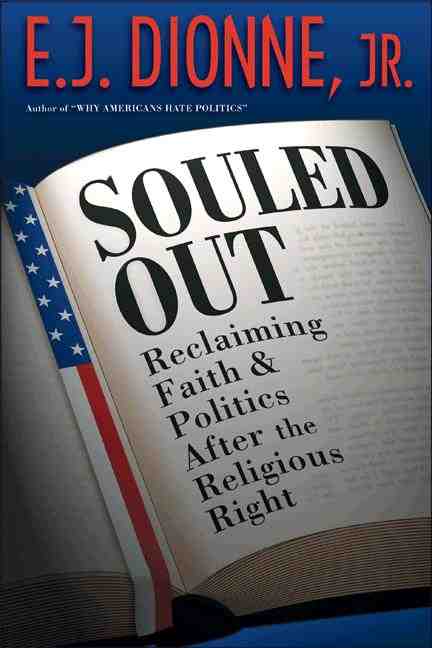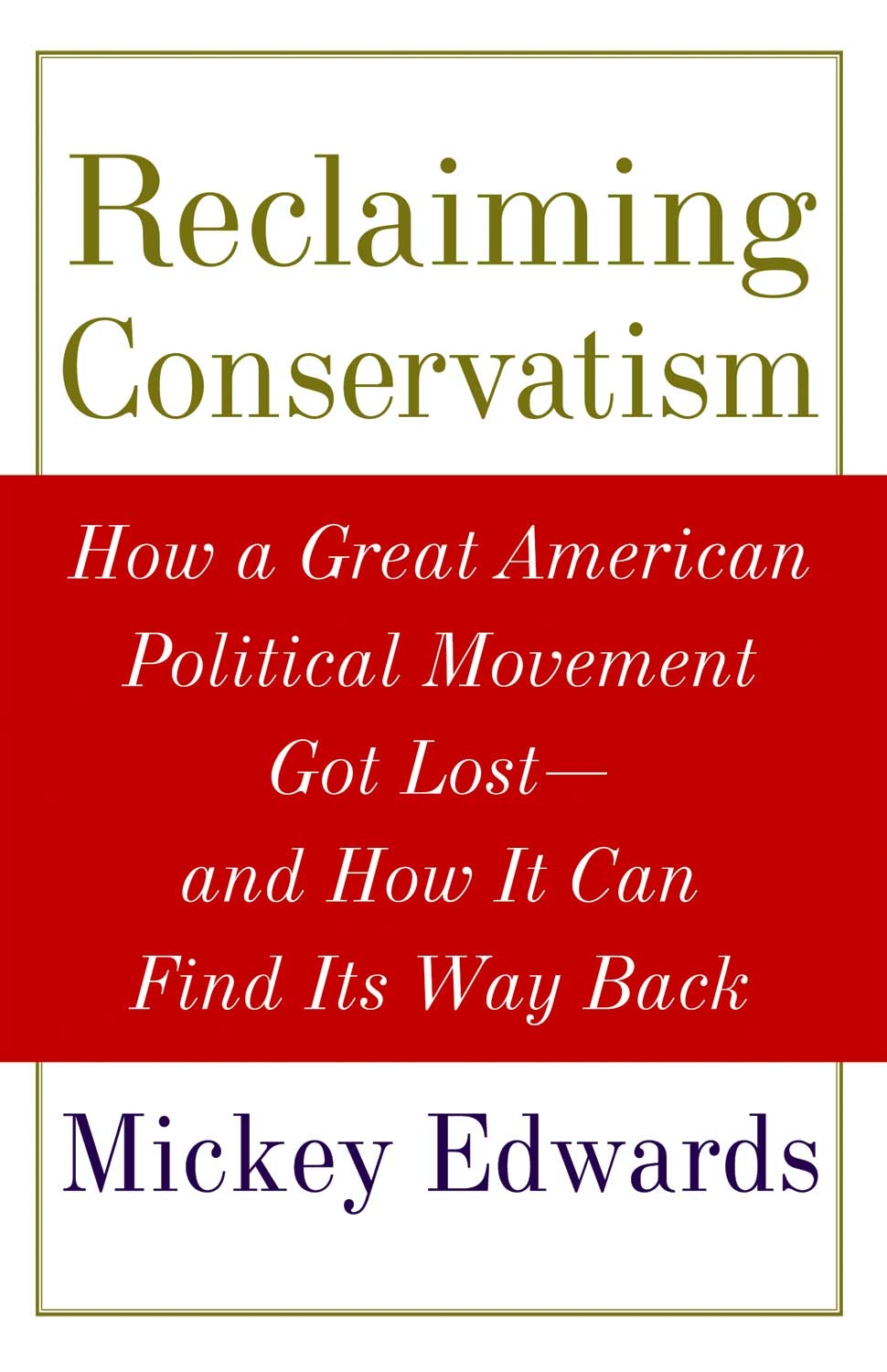Today we are proud to bring you E.J. Dionne, Jr. (who just published Souled Out) in conversation with Mickey Edwards(frequent OUPblog contributor and author of Reclaiming Conservatism). This is the third and final part of this series.
E.J. Dionne, Jr. is a syndicated columnist with The Washington Post, a senior fellow at the Brookings Institution and a professor at Georgetown University. He is the author of Souled Out: Reclaiming Faith and Politics After the Religious Right, which was published in January by Princeton University Press.
Mickey Edwards is a former Republican Congressman, founding trustee of the Heritage Foundation, and national chairman of the American Conservative Union. He is the author of Reclaiming Conservatism: How A Great American Political Movement Got Lost- and How It Can Find It Way Back
Email Three
Dear Mickey,
Once again, many thanks for your thoughtful reply. I do think you provide a model for other conservatives to emulate: You take seriously both the need for markets and the need for rules to govern those market; you take seriously social needs as well as individual needs; and you take seriously the fact that markets all by themselves will not always provide the goods we need (for example, health insurance for the elderly and the chronically sick). Your reply suggests that in the next era – whether we call it liberal or not — our country will have a rendezvous with problem solving, not problem avoidance.
emulate: You take seriously both the need for markets and the need for rules to govern those market; you take seriously social needs as well as individual needs; and you take seriously the fact that markets all by themselves will not always provide the goods we need (for example, health insurance for the elderly and the chronically sick). Your reply suggests that in the next era – whether we call it liberal or not — our country will have a rendezvous with problem solving, not problem avoidance.
Now I don’t want you to shudder and think, “My gosh, the last thing I need is for liberals to accord me that ‘strange new respect’ they always offer apostate conservatives.” So I want to close this exchange by taking your conservatism seriously, which everybody should.
Let me begin with progressive taxation. The case for higher taxes on the wealthy is straightforward: The wealthy have enjoyed the vast majority of the gains in wealth and income over the last seven years – and inequality has been growing for three decades. We have not had this level of inequality since 1929, a rather ominous fact when you think about it.
Permit me to cite some findings from my friends at the Economic Policy Institute. They noted recently that “median family income — income earned by families in the middle of the income distribution, with half of all families poorer and half richer — in the latest recovery has failed to recover the losses of the previous recession. This marks the first time this has happened since World War II in a business cycle lasting anywhere near as long as the most recent cycle.”
Another finding: “While productivity is up nearly 20% since 2000, the real median hourly wage is up 3% overall and 1% for men, with none of this growth occurring over the three-and-a-half years since 2003. At the top of the wage scale — at the 95th percentile — real wages are up 9%.” Finally, this: “After rising quickly in the second half of the 1990s, most workers real wages have been stagnant in the 2000s, especially since 2003. This result holds for a wide variety of wage and compensation measurements, including those that add the value of fringe benefits.”
The Bush Administration’s tax cuts have showered benefits on the wealthiest Americans at the very moment when their share of the economy is already going up. We need to offset inequalities with different tax policies and different social policies (notably universal health care) not just because that is just, but also because rising purchasing power across the economy is an essential component of growth and prosperity. A rising tide that actually does lift all boats tends to lift everybody’s boat faster and higher – including, by the way, the boats of the wealthy.
That’s also why I mention unionization. It’s clear that unions played an essential role in creating a broad middle class in our country by increasing the bargaining power of average workers. Our current low rates of private sector unionization are one reason for rising inequality.
Of course I agree with you that it’s a mistake to hold people harmless for foolish investments. But it’s striking that the Fed bailed our Bear Stearns even as we have done little to help homeowners caught in a mortgage mess that was in part created by deceptive practices on the part of lenders. I do not fault Fed Chairman Ben Bernanke for preventing a market meltdown. He did what was necessary. Still, it’s odd how even bailouts these days are unfair. And it’s also striking how many wealthy friends of the market and supporters of deregulation welcomed big government in this case. I quoted John Kenneth Galbraith on this phenomenon in a recent column. As the economist John Kenneth Galbraith noted of the era leading up to the Depression, “The threat to men of great dignity, privilege and pretense is not from the radicals they revile; it is from accepting their own myth. Exposure to reality remains the nemesis of the great — a little understood thing.”
I still miss Galbraith. But, for that matter, I also miss his friend Bill Buckley. Buckley provided conservatism with inspiration at a moment when liberals were still on the rise. You have taken on an even more difficult task: to inspire conservatives as a moment of decline. I hope you enjoy success – though, honestly, not too much success. There is a good deal of common sense in what you have to say, a lot of practical wisdom, and a refreshing willingness to think outside the narrow range within which Washington-based conservatism is currently trapped. We need more Edmund Burke and Robert Nisbet, and less of an ideology that has all the thoughtfulness of a direct mail piece. Godspeed in your effort to provide us with a considered, practical contemporary conservatism worthy of a great tradition.
Thanks, E.J
I’ve thoroughly enjoyed this exchange. While we may not always agree (for example, the problem
 in my view is not that the tax code is not progressive enough but that the current system of deductions and credits allows many of the most wealthy to avoid paying a fair share) you have again demonstrated both your impressive intellect and your serious concern for the well-being of that large number of Americans who find daily life a struggle even in a nation of unprecedented opportunity and prosperity. Your very generous comments about me, personally, and about “Reclaiming Conservatism” mean a lot to me, as does our friendship. Neither of us may have all the right answers, but so long as we and others like us are able to have a serious and respectful conversation about the future which will be common to all of us, the America we both love will grow only stronger and better. Thank you for joining in this discussion. I wish you the very best in all that you do
in my view is not that the tax code is not progressive enough but that the current system of deductions and credits allows many of the most wealthy to avoid paying a fair share) you have again demonstrated both your impressive intellect and your serious concern for the well-being of that large number of Americans who find daily life a struggle even in a nation of unprecedented opportunity and prosperity. Your very generous comments about me, personally, and about “Reclaiming Conservatism” mean a lot to me, as does our friendship. Neither of us may have all the right answers, but so long as we and others like us are able to have a serious and respectful conversation about the future which will be common to all of us, the America we both love will grow only stronger and better. Thank you for joining in this discussion. I wish you the very best in all that you do
Mickey





i cried a little…
Christmas (and wishful thinking) is just around the corner…
I got to get me one
What gets me is when it turns into a normal tablet when accessing a secondary display… genius.
Ok… we just had a Wacom sales rep come by our studio and demo the new Cintiq12WX so I wrote up a some thoughts on it …simply put, it’s amazing. All of us were drooling over it within seconds of seeing it. It’s about the size of a 9×12 wacom tablet in width and thickness and is extremely light and seemed to stay cool. The screen is bright and crisp. That said, the screen itself is a bit small, which is also part of it’s appeal in some ways. The rep had it running on a Mac with all of his fonts cranked down to like 6pt to make more real estate on the screen which was fine and readable. The side buttons are something I rarely use but will likey use now. The sliders are now pen stylus sensitive and can be tapped like a button to increase/decrease or scroll up/down or whatever buttons you want to program into them. Also you’ll notice the edges of the Cintiq are sloped downwards with the sliders on the outer edge to prevent accidental zooming/scrolling etc with your arms.
In size, it’s basically like working inside of a margined 8.5×11 surface. Some of the cool stuff about it is that it finally is practical to spin it around to draw tough angles thanks to its size and weight plus the little perfectly centered low profile nylon nub on the back that allow one to spin it on an axis. The stand on the back only has 2 positions standing or folded, but the standing position seemed fine if you need that. One could get a little creative and figure out how to angle it to diff positions if need be. The really cool thing is that it’s now practical to put the thing in your lap and work with it.
The ugly part of this is all the cabling. There’s a 4×4x1inch box that all your cables, including a monitor cable, have to be routed through. I guess there’s really no other solution to this unless they adopt the HDMI standard somewhere down the road. (not likely)
But the news that caught me by surprise was the price: According to tour rep here in the PNW, it’s going to be available mid December in the US for $995.00! We had all calculated $1700+ based on the Euro conversion rate but I guess they’re getting aggressive with it’s pricing in the US to get it out to as many students and professionals with portable studios as possible. I have a feeling you’re going to see a lot of these in cafe’s soon, I may be one of them:)
…ok after watching their little ad it looks like they’ll have multiple positions for the stand. We must have had an early version with only up or down position. Anyway I think you’re going to love it.
$995.00 US?!
# vincent giard says:
November 29th, 2007 at 1:51 pm
$995.00 US?!
That’s what the rep said…
The whole thing isn’t 26cm x 16cm, that’s just the size of the screen. Wacom’s site says the real dimensions are 405mm x 270mm and 17mm thick, or for US losers like myself, about 16″ x 10.6″ and two thirds of an inch thick.
That price is about what I thought it would be when I first saw this. A lot of things are more expensive in the UK so you can’t just estimate the US price by converting the price to dollars (which would come out to ~$1700). I mean, the regular Cintiq 21UX is selling for £2190 which is ~$4500, waaaay more than the $2500 it actually sells for here.
I estimated what it would cost by using percentages though. This new Cintiq 12WX is £830 which is about 38% of the cost of a Cintiq 21UX is ~£2200 in the UK. In the US, the Cintiq 21UX sells for $2500, but the price of the 12WX will still be about 38% of that which comes out to $950 — pretty close to the $995 that Rayl was quoted.
This is great news. I was just about to pull the trigger on the 21UX. I’ll be checking out Wacom’s site every day.